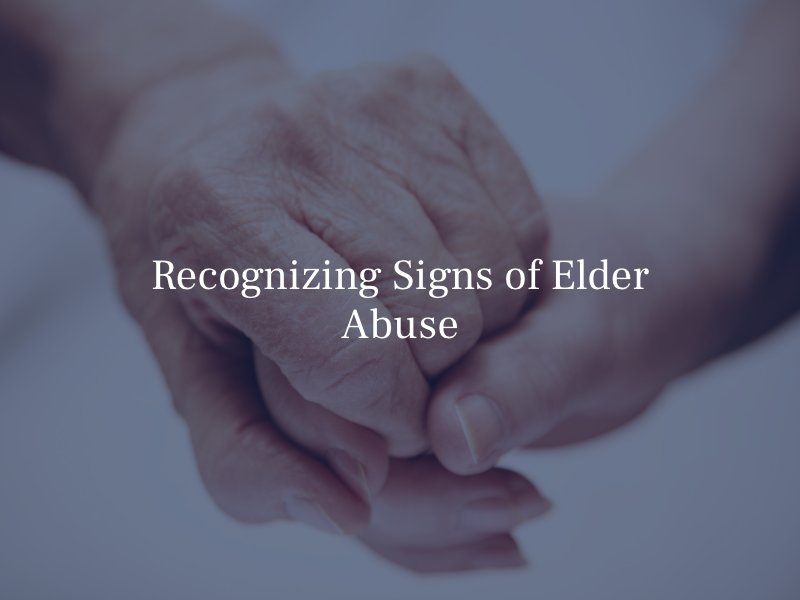
Recognizing Signs Of Elder Abuse
CLICK FOR FREE CONSULTATIONElder abuse occurs when someone in a position of trust inflicts harm, neglect, or exploitation on an elderly person. Unfortunately, elder abuse often goes unnoticed, leaving vulnerable individuals to suffer in silence. Recognizing the signs is critical. Our Beaumont elder abuse attorney believes in upholding the integrity of seniors and can hold negligent and abusive parties accountable.

Types of Elder Abuse and Their Signs
Elder abuse can manifest in various forms and each type has distinct signs:
Physical Abuse
Physical abuse involves the use of force that causes bodily harm, pain, or injury. Common signs include:
- Unexplained bruises
- Cuts
- Broken bones,
- Other injuries that do not match the explanations given by the elder or their caregiver.
The presence of frequent injuries in different stages of healing may indicate repeated abuse. Additionally, the individual may exhibit signs of fear, anxiety, or reluctance to speak in the presence of the abuser, suggesting they are being physically intimidated.
Emotional Abuse
Emotional or psychological abuse is the infliction of mental distress through verbal or non-verbal actions, such as threats, insults, humiliation, or isolation. Signs include:
- Withdrawal
- Depressed
- Unusual changes in behavior, such as becoming unusually agitated or unresponsive.
- Avoiding eye contact or seeming fearful of their caregiver.
Emotional abuse can create a constant state of fear, eroding the elder’s self-worth and sense of security.
Sexual Abuse
Sexual abuse involves any non-consensual sexual contact with an elderly person. Physical signs include:
- Bruising
- Bleeding
- STDs
- Changes in demeanor, such as sudden anxiety or discomfort around certain people.
This type of abuse is particularly challenging to detect in older adults who may have cognitive impairments, such as dementia, that prevent them from fully comprehending or communicating the abuse.
Financial Abuse
Financial exploitation occurs when someone illegally or improperly uses an elderly person’s financial resources for their own gain. Signs of financial abuse include:
- Sudden and unexplained withdrawals from bank accounts.
- Changes in wills or financial documents
- Missing assets
- Bills for services they did not use.
- Insufficient funds to pay for basic needs like food, utilities, or medical care, despite having adequate financial resources.
- Unusual transactions.
- New “friends” or advisors who take control of the individual’s assets.
Neglect
Neglect occurs when a caregiver fails to provide the necessary care for an elderly person’s physical, emotional, or medical needs. Signs of neglect include:
- Malnutrition
- Dehydration
- Poor personal hygiene
- Untreated medical conditions
- Unsafe living conditions
- Dirty or cluttered living conditions
- Disheveled appearance
- Soiled clothing or bed linens
Neglect can be intentional or unintentional, but in either case, it can have devastating consequences for the person’s health and well-being.
What to Do If You Suspect Elder Abuse
If you suspect that an elderly person is being abused, here are a few steps you can take immediately:
Document the Signs
Keep a detailed journal of any signs or symptoms of abuse or neglect, including dates, times, and any physical evidence or behavioral changes you observe.
Report Your Suspicions
Call 911 or local law enforcement’s non-emergency number if the individual is in immediate danger. Otherwise, contact local adult protective services (APS). Riverside County’s APS is responsible for investigating cases of elder abuse, neglect, and exploitation of adults 65 years or older and dependent adults aged 18-64. The hotline 1 (800) 491-7123 is available 24 hours a day, seven days a week.
If the elder is living in a nursing home, assisted living facility, or residential care facility, you can report suspected abuse to the Long-Term Care Ombudsman.
- Phone: You can reach the Riverside County Ombudsman Program at (800) 464-1123.
- Statewide 24-hour Crisis Line: Call (800) 231-4024 for emergencies related to care facilities.
A Long-Term Care Ombudsman works to ensure that residents’ rights are protected, investigate and resolve complaints related to care and services, and provide education about the rights of long-term care residents.
Offer Support
Offering emotional support and listening without judgment can help an abused individual feel empowered to seek help.
Speak to a Lawyer
An experienced Beaumont personal injury lawyer will investigate crimes against older adults and help you hold the responsible party accountable. They can also provide information on legal protections and assist with the reporting process.